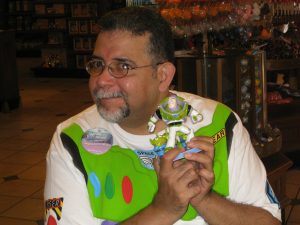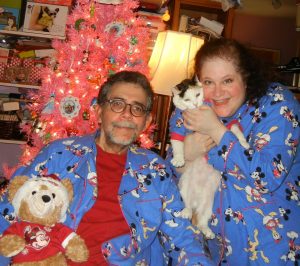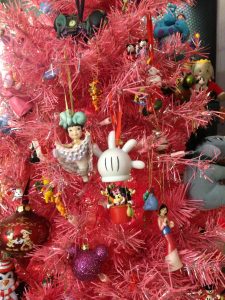A Tribute to Walt Disney (12.5.1901-12.15.1966)

Walt Disney’s legacy lives on so vibrantly and timelessly in so many ways that it’s hard to believe that today, December 15, 2016 marks 50 years since he left this earth. I’m sure it’s no surprise that I love to read about him, and to get a glimpse into his artistic vision and the building of his business enterprises. His belief in himself and commitment to his art are things that we can all learn from. I remember my mom talking about her favorite Disney movies and how she loved Mickey Mouse from the time she was a child. She was just a little girl when he was “born.” “Mary Poppins” was the first movie I ever saw in a theater. It just amazes me how Mickey and his friends touch the hearts of generation after generation. I believe that 50 years from now, and, as Buzz Lightyear would say, “to infinity and beyond,” Walt’s words of wisdom will still stand strong, as will his legacy.
My blog was inspired by the way that I was affected by Disney films, characters and lyrics in light of caregiving and loss. The same can be said about many of the quotes I’ve read by Walt. It seems to me that this is a good day to reflect on some of his words of wisdom that have consoled me, intrigued me and entertained me. Now, they are helping me to look forward and I think that’s especially significant as we approach a new year.
“That’s the real trouble with the world. Too many people grow up. They forget.”

As someone who still has a lot of my childhood dolls and can’t resist adding new ones to my collection, it is obvious to everyone who knows me that I completely embrace the idea that you need to hold on to your inner child. As I’ve said, my inner child is very much at the forefront of who I am. For me, watching a Disney film, and imagining a fairy or fairy godmother at my side, also allowed me to escape the realities of caregiving and loss. My husband, Ben, always said that he loved Walt Disney World because you simply forgot your problems. With a diagnosis of ALS, his problems were huge, but immersed in that fantasy land, he was a big kid having a wonderful time, even despite his challenges. For him to be able to feel that sense of joy and excitement was a gift. Walt Disney envisioned and provided that magical setting. I never want to lose the attitude that allows me to step right into the fantasy the way I did with Ben. I never want to have to stop wishing on stars or forget the wonder and delight that I had as a child.
“Why worry? If you’ve done the very best you can, worrying won’t make it any better.”

This is absolutely true. Alas, I am a worrier, and I have to work on this, but Walt is right. I can’t say that any of my worrying helped, although perhaps thinking through worst case scenarios may have helped me prepare for a variety of situations. I’ve heard that worrying burns calories, but I’ve seen no indication that this works! I worry now about my future, particularly without much family. But, the worrying isn’t going to affect any change, so it’s time to proceed in the best way I can, and make decisions I feel will help me to create a new life, or, rather, enhance my current one with new love, laughter, joy and peace. I’m going to try harder to listen to Walt on this piece of advice!
“Life is composed of lights and shadows, and we would be untruthful, insincere and saccharine if we tried to pretend there were no shadows.”

Grief is tricky. I feel myself take steps forward, and then something triggers a setback. The reactions people have to grief also vary. Some people expect you to “get over” loss within a designated time period. Some people want you to act like everything is fine, because they are the ones who really cannot handle the emotions. I do feel like there is more light in my life now, which sometimes makes me feel guilty but also makes me happy, and I know that the people who love and care for me are glad to see me beginning to enjoy life again. But there are also shadows, and I am not someone who likes to, or can, put on a show of emotions. It’s all okay.
“I always like to look on the optimistic side of life, but I am realistic enough to know that life is a complex matter.”

The Wishing Well at Cinderella’s Castle. We always wished for a cure for ALS. I still hope that wish comes true.
Some people might think that my obsession with all things Disney and talk of pixie dust and wishing on stars is silly. Well, I think silly is just fine (okay, within reason.) I like to think that it is my inner child reminding me of possibilities and letting me believe in my own happy endings. But, just like Walt, I am realistic and I have experienced enough of life to know that things get complicated, and sometimes, downright ugly. In the face of life’s complexities, it helps me to stay positive if I escape for a while into a Disney frame of mind.
“In bad times and in good, I have never lost my sense of zest for life.”

This quote made me think of Ben and his determination to enjoy life despite ALS. He surrounded himself with music and technology, and he ventured into the world and enjoyed all that he could with a zest for life that, I believe, let him manage the disease well for about four years. It was certainly a good lesson for me.
“We keep moving forward, opening new doors, and doing new things, because we’re curious and curiosity keeps leading us down new paths.”

This quote is my current inspiration for the future. I believe that my curiosity, desire to learn, love and compassion will carry me forward to find new and more love, laughter, peace and joy. I cannot deny that right now I feel a bit lost. At the same time, I feel cautiously optimistic about the exploration.
“All our dreams can come true, if we have the courage to pursue them.”

I think that I finally have the strength to summon the courage to follow my dreams. It feels pretty great, and yet a bit scary, to say that. I do believe that pixie dust would help.
“Laughter is timeless, imagination has no age, dreams are forever.”

This is a comfort to me. Laughter, imagination, dreams and, of course, love, were the key ingredients in surviving years of caregiving and loss. They have always been there when I needed them, even if, at times, they felt out of reach. This is something to remember always. Never lose hope. Never lose the spark of a dream.
“First, think. Second, believe. Third, dream. And finally, dare.”

That sounds like a good plan! Thank you, Walt!











